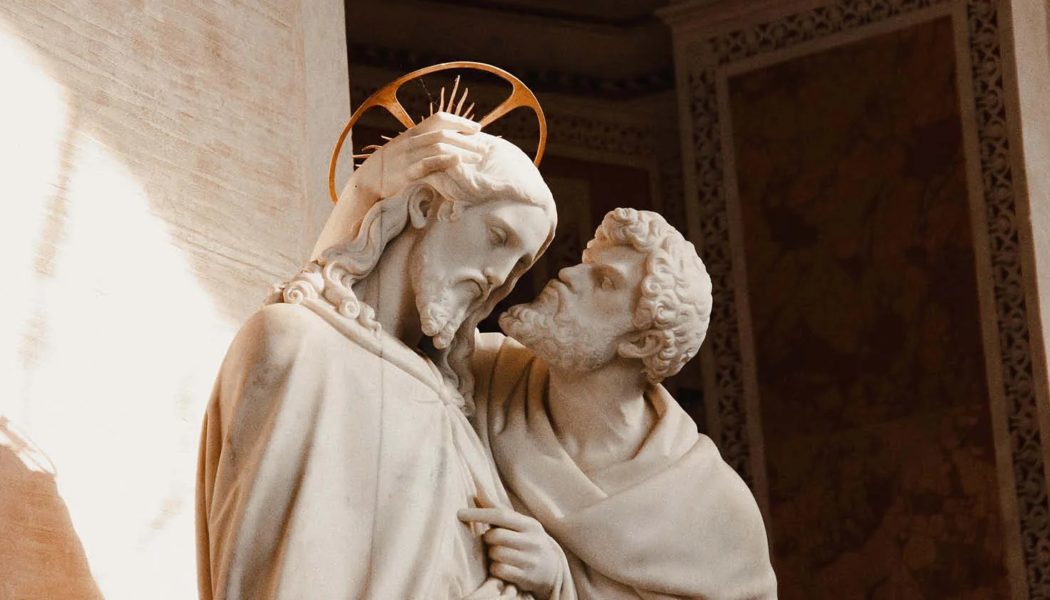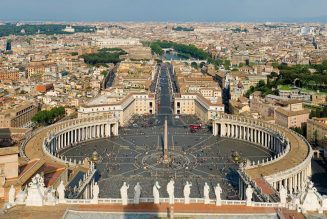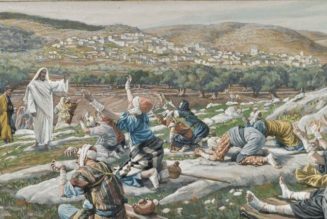
Jesus gives us a new commandment this Sunday, the Fifth Sunday of Easter Year C, but it is easy to get this new commandment wrong
“Love one another as I have loved you,” he says. We imagine this means “Have a big heart that embraces mankind.” In fact, though, it means, “Don’t trust your feelings. Stop pleasing yourself with evil. Stand up for truth and goodness, even if it hurts — even if it means losing friends.”
In John, Sunday’s Gospel reading is sandwiched between two painful passages.
It is the night before his death. Jesus washes his apostles’ feet — 12 apostles, 24 feet. Then he announces that one of them will betray him. It turns out to be Judas, who promptly walks out, dirtying the feet his best friend and Lord just cleaned.
It is only then that Jesus says what we hear today — “Now is the Son of Man glorified, and God is glorified in him” — and gives them the new commandment to love as he loves. St. Peter enthusiastically agrees to these new terms, saying he will lay down his life for Jesus. No you won’t, says Jesus. “The cock will not crow before you deny me three times.”
So when Jesus says “now” he is glorified, he means now that one of my best friends just walked out on me to betray me. When he says “love as I do,” the first person to agree is the “rock” of his life’s mission, but he won’t even stand up for him to a servant a few hours later.
Losing a friend is perhaps the worst feeling in the world — but one feeling might be worse: When a friend refuses to stand by your side when you really need him to. Human love totally failed Jesus, but he didn’t ask for human love. He asked for more.
This Sunday’s readings share an inspirational example of the love Jesus wants: St. Paul.
Again, look at what happened just before Sunday’s reading in Acts, Chapter 14. Paul and Barnabas visited Lystra and the people mistook them for gods, calling Paul “Zeus” and Barnabas “Hermes.” This greatly distressed Paul, who had to shout down the crowd to (barely) keep them from sacrificing to him. Then, out of nowhere, this happened: “Some Jews from Antioch and Iconium arrived and won over the crowds. They stoned Paul and dragged him out of the city,” leaving him for dead. When the Christians gathered around his body, to mourn, Paul unexpectedly got up.
It is after this that St. Paul tells the Christians, “It is necessary for us to undergo many hardships to enter the kingdom of God.” He literally means: It is necessary to love God even when pagans try to drag you into their sacrifices. It is necessary to love God even when your former friends pummel you with rocks and drag your lifeless body out of town.
So, to “Love one another as I have loved you,” as Jesus requests in Sunday’s Gospel, prefer God’s will to your best friends’ friendship. To imitate the love of St. Paul, reject the pagan ways that are popular — for us, perhaps, the redefining of marriage, the lies about the body, and the rejection of the helpless unborn. Keep rejecting it, even if your friends abandon you, and even if mobs desecrate your church, disrupt your Mass, and shout obscenities at your children, as they did on Mother’s Day. That is real love that suffers in order to will good to all.
How is this love even possible for us? It wasn’t possible for Peter or Judas — or even for St. Paul.
The First Reading from Acts ends by saying Paul and Barnabas “reported what God had done with them” in their mission to the Gentiles. They weren’t just being humble. They knew that what they accomplished was something God did with them not something they did for God.
In the Gospel of John, Jesus spends four chapters explaining how this works: We can only love like him if we 1.) See the Father in Jesus, 2.) Abide in Jesus, the Son, and 3.) Receive the Holy Spirit. In other words, says the Catechism, we have to live “the very life of the Holy Trinity, which is to love as ‘God has loved us.’ This love is the source of the new life in Christ, made possible because we have received ‘power’ from the Holy Spirit.”
St. John Chrysostom said this kind of love is what spreads Christianity. “Miracles do not attract unbelievers as much as the way you live your life. And nothing brings about a proper life as much as love,” he writes. Jesus “makes love the distinguishing mark of his followers.” That means, again, that what is needed isn’t great feelings and holy attributes, but real deed done, despite bad feelings and difficult circumstances.
We will get two kinds of glory if we are willing to do it.
When Jesus says “Now is the son of man glorified,” he means that his passion is coming. That is the first kind of glory; the glory of the martyrs — and it is a real glory: We all admire the breathtaking courage and integrity of men and women who die for God. That glory changes us and can change whole nations.
But it leads to a greater glory. In the Second Reading, we hear John describe it: “I, John, saw a new heaven and a new earth,” it says. “I also saw the holy city, a new Jerusalem, coming down out of heaven from God, prepared as a bride adorned for her husband.“ His reading ends with a line many of us know from the movie The Passion of the Christ, when Jesus, bloodied, carrying his cross, says to his mother, “Behold, I am making all things new.”
That gets it exactly right. And how does he “make all things new”? The Second Reading explains: “Behold, God’s dwelling is with the human race. … He will wipe every tear from their eyes, and there shall be no more death or mourning, wailing or pain, for the old order has passed away.”
He makes all things new by destroying death, once and for all, with his Resurrection, and gathering us to live with him, as Adam and Eve did in the Garden of Eden. I love how St. Bede described one of the joys of this new, heavenly existence: “Death has been sent into the lake of fire,” he says. “When the holy city has been glorified at the last judgement, mourning and crying and mortality will remain in Gehenna.”
We want to be sure to be in the right place when that happens.
Join Our Telegram Group : Salvation & Prosperity








